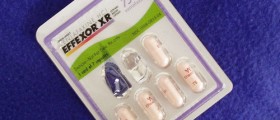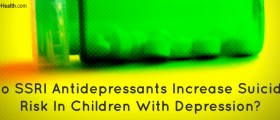
Desvenlafaxine for Depression Treatment
Desvenlafaxine is a type of antidepressant medication from the family of selective serotonin reuptake inhibitors. The drug is also being used for treating the symptoms of menopause without hormonal therapy. Desvenlafaxine was approved by the Food and Drug Association in 2008 for treating major depression disorder as defined in the DSM. In order to reduce the symptoms of depression, desvenlafaxine acts on the neurotransmitters, which are essentially chemicals produced in the brain via which the nerves exchange messages. It is generally believed that a chemical imbalance between the neurotransmitters is responsible for causing depression. By preventing the reuptake of serotonin and epinephrine desvenlafaxine increases the effects of serotonin and norepinephrine, resulting in an optimal hormonal balance. The medication exists in brand and generic versions and both require prescriptions. Desvenlafaxine is administered orally in tablets of either 50 or 100 mg. The packaged medicine should be kept out of reach of children and stored in a dark, cold place. The 50 mg dosage is administered more frequently and the medicine is taken once a day. Desvenlafaxine does not interact with food in any way. If there are other medications that the patient is using all participating medical care providers need to be made aware as to avoid any unwanted interactions between the drugs. When it comes to taking desvenlafaxine during pregnancy there haven’t been enough research studies to confirm or disprove any possible negative effects on the fetus. The prescribing physician must be certain that the benefits for the mother outweigh the possible developmental consequences for the baby. In the case of breastfeeding there is likewise a deficiency in significant data and it is unknown whether it is unsafe to nurse while taking desvenlafaxine. Most of the research studies so far have only been conducted on animals and the results are difficult to transfer onto humans.
Side Effects of DesvenlafaxineWhen it comes to the side effects produced by desvenlafaxine, the most common ones include headaches, stomach aches, nausea, vomiting, loose bowel, constipation, and a loss of appetite. In most research and clinical studies nausea came on top as the number one side effect of desvenlafaxine. In predisposed patients increases in blood pressure are possible, and so are occasional epileptic seizures. As is the case with most antidepressants, sexual dysfunction which takes on many forms is reported. In addition, some patients face increased perspiration, abnormal bleeding when bruised or cut, vision problems, and increased cholesterol levels. Those who suffer from underlying cardiovascular illnesses need to make sure the desvenlafaxine does not cause more harm than good as it is known to increase the heart rate besides blood pressure. Patients who are affected by high blood pressure without taking the medication need to have regular checkups to monitor any possible changes. When it comes to consuming desvenlafaxine with alcohol the produced effects are not as strong as they are with some other antidepressants but it is recommended that users of desvenlafaxine stay away from alcohol as its sedating effects might be stimulated. In turn, the central nervous system would slow down, which could result in serious consequences in certain individuals. It is also unclear whether the drug interferes with operating a motor vehicle or heavy machinery so caution is always advised. It is of dire importance to mention that most antidepressants initially increase the intensity and frequency of mood disorder symptoms which can lead to suicidal thoughts and attempts. Once the early stages of taking desvenlafaxine are overcome the medication starts to stimulate antidepressant actions. Also, sudden discontinuation could result in withdrawal, which is in most cases characterized by increased feelings of depression and anxiety, insomnia, irritability, and nausea. It is advised that if the prescribing physician believes the person is ready to be taken off the medication the dosage needs to be reduced gradually. Former users of the medication agree that the withdrawal symptoms are very intense and some find them beyond bearing. The longevity of withdrawal complications is also an issue as they keep on appearing from longer than is the case with other antidepressants. Lastly, numerous research studies point to a correlation between taking antidepressants by children and adolescents who beside depression are battling other psychological disturbances and suicidal behavior. Close friends and family members should pay special attention and be on the lookout for any changes in behavior pointing to suicidal thoughts or attempts. Physicians who prescribe antidepressants to young persons suffering from additional psychiatric problems also need to monitor the patient closely and make sure the risk is worth it. Also, the packages of the medication come with a label that warns the potential users of the increased risk of suicide. Such effects are particularly strong on older children and young adults. Younger children who are experiencing signs of depression are not permitted to use desvenlafaxine as per the FDA.

















Your thoughts on this
Loading...